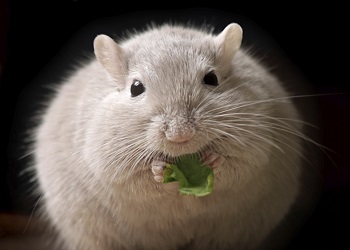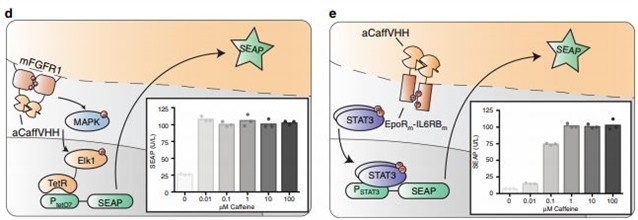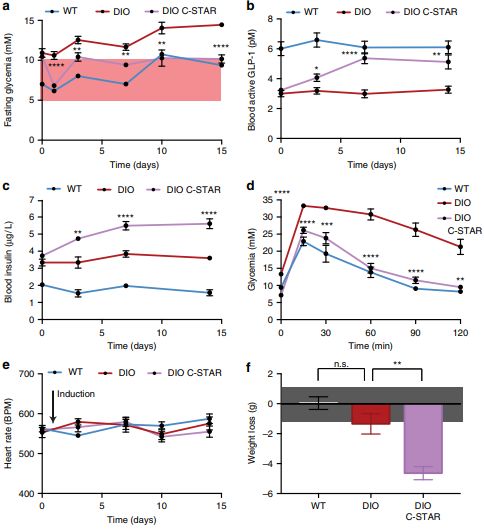论文标题:Caffeine-inducible gene switches controlling experimental diabetes
期刊:Nature Communications
作者:Daniel Bojar, Leo Scheller, Ghislaine Charpin-El Hamri, Mingqi Xie & Martin Fussenegger
发表时间:2018/06/19
数字识别码:10.1038/s41467-018-04744-1
原文链接: https://www.nature.com/articles/s41467-018-04744-1?utm_source=Other_website&utm_medium=Website_links&utm_content=RenLi-Nature-Nature_Comms-Biology-China&utm_campaign=NATCOMMS_USG_rlp8212_diabetes_sciencenet_article_June_4th

本周《自然-通讯》发表了一项小鼠糖尿病模型研究Caffeine-inducible gene switches controlling experimental diabetes,表明可以通过咖啡中的咖啡因激活一种合成遗传回路,用以调节血糖水平。

图1:利用合成生物学遗传回路实现咖啡因诱导的基因表达。
Bojar et al.
II型糖尿病影响着全球逾4亿人口,带来了大量医疗成本。成功的健康管理需要能够监测进食后的血糖上升情况,并做出响应。
瑞士苏黎世联邦理工学院的Martin Fussenegger及同事研究了咖啡因是否能用于诱导基因表达以帮助调节血糖。作者设计了一种合成生物学遗传回路——咖啡因刺激型先进调节器(C-STAR),它可以响应商业产品中的咖啡因,生成一种可用于治疗II型糖尿病的肽。在小鼠糖尿病模型中,携带C-STAR系统的细胞帮助小鼠在摄入咖啡后控制血糖水平。

图2:用携带C-STAR系统的细胞治疗饮食引起的患糖尿病的肥胖小鼠。
Bojar et al.
虽然这只是一个原理验证演示,表明遗传回路可利用常见化合物调节身体状况,但是它同时也展现了未来合成生物学有望在将生活方式干扰降到最低的情况下,应用于医疗保健领域的潜力。
摘要:Programming cellular behavior using trigger-inducible gene switches is integral to synthetic biology. Although significant progress has been achieved in trigger-induced transgene expression, side-effect-free remote control of transgenes continues to challenge cell-based therapies. Here, utilizing a caffeine-binding single-domain antibody we establish a caffeine-inducible protein dimerization system, enabling synthetic transcription factors and cell-surface receptors that enable transgene expression in response to physiologically relevant concentrations of caffeine generated by routine intake of beverages such as tea and coffee. Coffee containing different caffeine concentrations dose-dependently and reversibly controlled transgene expression by designer cells with this caffeine-stimulated advanced regulators (C-STAR) system. Type-2 diabetic mice implanted with microencapsulated, C-STAR-equipped cells for caffeine-sensitive expression of glucagon-like peptide 1 showed substantially improved glucose homeostasis after coffee consumption compared to untreated mice. Biopharmaceutical production control by caffeine, which is non-toxic, inexpensive and only present in specific beverages, is expected to improve patient compliance by integrating therapy with lifestyle.
阅读论文全文,请访问:https://www.nature.com/articles/s41467-018-04744-1?utm_source=Other_website&utm_medium=Website_links&utm_content=RenLi-Nature-Nature_Comms-Biology-China&utm_campaign=NATCOMMS_USG_rlp8212_diabetes_sciencenet_article_June_4th(来源:科学网)
特别声明:本文转载仅仅是出于传播信息的需要,并不意味着代表本网站观点或证实其内容的真实性;如其他媒体、网站或个人从本网站转载使用,须保留本网站注明的“来源”,并自负版权等法律责任;作者如果不希望被转载或者联系转载稿费等事宜,请与我们接洽。